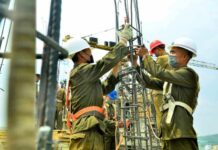As the rice harvest begins in North Korea’s agricultural areas, people are already worrying about getting through the winter amid expectations that this year’s crop yields will fall short of previous years.
Speaking on condition of anonymity for security reasons, a source in South Pyongan Province told Daily NK on Wednesday that “people believe the harvest will be poor because there were droughts and floods this year and fertilizer was poorly provided,” and that “we’ll learn the exact numbers after the harvest is finished, but for now, many people predict it will be less than in years past.”
North Korea experienced repeated droughts and localized downpours ahead of the rice-planting season this year and heatwaves and torrential rains in summer, adversely affecting crops. The country was unable to properly respond to these natural disasters as it could not import needed agricultural supplies like fertilizer and pesticides due to the continued closure of its borders.
Crop yields are consequently expected to be poor this year, which has led to growing anxiety among many people about how to prepare for the approaching winter months.
“There could be difficulties preparing for the winter due to the insufficient harvest,” the source said. “Many people worry that they will have to struggle through the winter this year if there’s not enough food to go around.
“In fact, there has never been enough food for winter, regardless of whether the farming season went well or not. If the harvest is good, [the government] takes a lot for military rice stores and all sorts of other reasons. And even when farming doesn’t go well, it siphons off food as ‘voluntary’ donations of patriotic rice and support for labor brigades, all the while telling us to display patriotism.”
Similar to past years, North Korea is mobilizing many of its people for the autumn harvest, which has led to widespread discontent.
“Some people have no complaints about the mobilization, but many more are unhappy about it,” the source said. “If all you had to do is show up and take part in the harvest, nobody would have any complaints. But the government is telling everyone to prepare rice and other foods on their own, which has led to the emergence of discontent.
“Lots of people think that while that might be fine when times are good, they really shouldn’t have to prepare things when everyone is struggling to survive.”
Conflicting claims about expected crop yields this year
Meanwhile, the South Korean government has claimed that North Korea’s food situation may have improved.
Meeting with reporters on Tuesday, an official from the Ministry of Unification said it believes North Korea suffered food shortages in the first half of the year, though this was more due to distribution problems than absolute quantities of food.
“Afterwards, with North Korea increasing food imports and the harvests of barley, wheat and other crops well underway, the food situation may have changed,” the official said.
In fact, Russia’s ambassador to North Korea, Aleksandr Matsegora, told Sputnik News and other Russian media in an interview on Sunday that while he expressed his country’s willingness to provide North Korea with food aid, the North did not want it, and that North Korea’s had achieved a decent harvest this year.
However, Voice of America reported on Aug. 31 that the US Department of Agriculture, in a recently published report entitled “North Korea MY 2023/24 Seasonal Crop Outlook,” said that North Korea produced 2.1 million tons of rice this year.
In the report, the agency said that this figure was similar to North Korea’s total rice production last year.
Translated by David Black. Edited by Robert Lauler.
Daily NK works with a network of sources who live inside North Korea, China and elsewhere. Their identities remain anonymous due to security concerns. More information about Daily NK’s reporting partner network and information gathering activities can be found on our FAQ page here.
Please direct any comments or questions about this article to dailynkenglish@uni-media.net.


















